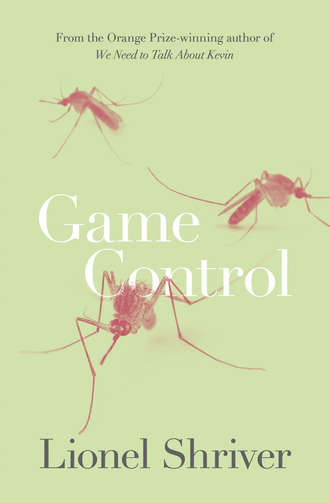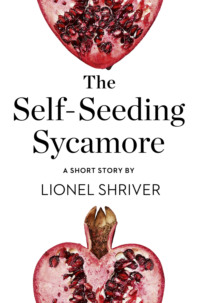
Полная версия
Game Control
The woman’s name, incredibly, was Bunny.
“The whole race is lemming off the cliff,” she despaired, “while demographers fuddle over fertility in Popua in 1762.”
“Lemmings,” Eleanor intruded bravely, “did you know they throw themselves off a precipice in response to population pressure? They crowd off cliffs. When Walt Disney filmed the rodents, the crew trapped hundreds and then had to drive them over the edge, beating sticks.”
“It must be terribly frustrating if subjects won’t obligingly commit suicide when your camera is rolling.”
That was Wallace, passing comment on his way for more tea. Only Wallace heard Eleanor at all. It was a perfectly serviceable party anecdote, but when Eleanor told stories that worked for everyone else they dropped, lemming-like, to sea.
Eleanor took being ignored as an opportunity to study the round-table. Bunny showed all the signs of having once been quite an item, and would still qualify as well kept—thin and stylishly coiffed, with unpersuasive blonde hair tightly drawn from a face once striking, now sharp. But she had retained the mannerisms of beauty. Sitting at an angle with her cigarette coiling from an extended arm, she spread a calf on her other knee as if posed perpetually for a shutter she had failed to hear click twenty years ago. Such miracles of taxidermy might have cautioned Eleanor to age with more grace, but she herself had never felt dazzling, and perhaps this was the compensation: that in later years, at least she would not delude herself she had retained powers she never thought she wielded in the first place.
Eleanor conceived few dislikes, being more inclined to give strangers a break, and another after that, as if beginning a set of tennis with first serve in. When company repeatedly made remarks that were out of bounds, she would promptly provide them with incestuous childhoods, crippling racial discrimination or tragic falls down the stairs to explain the viper, the thief, the moron. But Eleanor’s distaste for Bunny was instantaneous. British, the woman only turned to Eleanor once, to translate that “nick” meant steal. Eleanor suggested, “Be sure to tell Calvin. He’s American, too, you know.”
“Only half,” said Bunny coolly.
Bunny was loud and over-animated, but Eleanor was convinced that as soon as Bunny strode out of earshot of Calvin Piper all that environmental indignation would fall by the wayside like paper wrapping.
The rigid man to Calvin’s right was the only guest in a suit and tie. Every once in a while his mouth would quirk with annoyance. He gave the impression that he disapproved of their contingent’s retirement to some petty Nairobi social fritter; he’d have preferred to continue meeting. His surface was metallic. His name was Grant. Tall, grave and grey, he was one of those people, she supposed, who had been told the fate of the world rested on his shoulders and actually believed it. He reminded her of the men you found in Washington shuttle lounges, furrowed over computers, using their oh-so-precious five minutes before take-off to write that crucial report on sales of soap. You would never catch them out with a mere magazine, though Eleanor was always convinced that behind their PCs they were secretly weaving sexual fantasies and the screen was blank.
On the other side of the table, a small, nervous Pakistani and a corpulent Kikuyu were exchanging stories about murderous eight-year-olds in Natal. The Pakistani, Basengi, could not sit back in his chair or keep his hands still. He would pick up his glass and put it down again without taking a sip, and his place was rubbled with a shrapnel of potato crisps. His eyes worried about the room as if, should his glance not pin every object down to its appointed place, all of their host’s possessions would run away. He perpetually wiped his palms on his trousers. “Louis, you hear so often ‘innocent children’,” he said. “I never meet innocent children. They are like us. They are little barbarians.”
“A woman’s view, Eleanor?” asked Louis. “Do you believe we are all born saints? Do we only learn to slit throats from watching grown-ups butcher each other first or does the idea pop up of its own accord?”
“I suppose it’s some of both,” Eleanor stuttered, flattered to be brought in finally. “Of course I’ve seen malicious children. Horrid children. But I’ve also seen children that, yes, were pure. Generous, affectionate and utterly without guile. Some children are innocent. Then, so are some adults.”
The African chuckled. His laugh was splendid, booming and amoral, and from it Eleanor could picture this prankster as a boy—a plotter, a snitcher of sweets. “Name one.”
“Eleanor Merritt.”
She turned to Calvin, surprised. “From you,” she considered, “I wonder if that isn’t an insult.”
“Ray Bradbury, Louis,” Calvin commended. “All the kids in his stories are holy terrors. For Bradbury, the question isn’t whether children have the capacity for evil. It’s whether they have a special capacity.
“Yet if we concede that kids have roughly the same proportion of treachery, dishonesty and cussedness as the rancorous adults they become, why do the little nippers occupy an exalted moral position? Why in war is it especially appalling to kill women and children? Why is it so much more tragic when the roof falls in on a kindergarten than on a shoe factory?”
“Maybe it’s all that life unlived,” said Eleanor.
“Well, doesn’t that make them lucky? And won’t there be plenty more drooling, farting, upchucking runts to replace them? No, it’s this myth of innocence, which is maudlin tripe. Why, you have to kill ten adults to get the same size headline in the States that you can score with one dead toddler.”
“These days,” said Bunny, “you’ll earn far better coverage with cruelty to rats.”
“Mice!” cried Calvin. “She’s right! There’s a lab where I started my density experiments in DC. I had to move operations, because you would not believe the restrictions. The mice eat better than the staff. They have clean little beds made for them every night. They have their own vet, their own surgeon, and if you’re caught so much as pricking a paw without due cause, the approval of the Animal Care Committee or adequate anaesthesia, you’re out on your ear. Humidity and temperature control, vitamins—those mice are pampered brats. I began to detest them personally. Noses in the air, they swaggered across their gilded cages, pugnacious in their confidence that they couldn’t be made to suffer without your funding going to hell. I wasn’t a scientist. I was a mouse-sitter.
“However,” he continued, and no one would interrupt, “some of the Little Lord Fauntleroys have since escaped. I gather there’s a huge population of pests in the basement. The janitors kill them mercilessly by the dozen every night. None of the scuttling hoards in the basement is protected by the Animal Care Committee. They’re exactly the same species, but slaughtered with impunity and no one cares. No vitamins. No fluffed pillows. Just the usual desperate foraging and sticky traps.”
“Life is cheap in the under class,” said Louis.
Eleanor was struck that while Calvin spoke of people as vermin, he spoke of vermin as people—she had never heard him describe his relationship to any human population as personally as his relationship to those mice.
“These animal rights people,” Basengi was saying excitedly, “they are crazy. They have started shooting and bombing in London. And yes, you cannot do the simplest experiment in universities any more. This alone is a very good reason to keep our own—”
“Basengi,” said Calvin sharply.
The Asian clapped his mouth shut and mashed another crisp. The others, too, resettled in their chairs and reached for their drinks and laughed, at nothing. It was hard to get conversation going again. Three rose to go. When Calvin himself stood up, half the remaining party began collecting their coats.
“Grant, you will remember to—?” asked Calvin.
“Yes.”
“And Louis, you will call—?”
“Right away.”
“And send me—?”
“Of course.”
Bunny loitered behind after the others had left, conferring with Calvin in a low voice, inclined as far forward as Malthus would allow. Eleanor positioned herself determinedly at Calvin’s other side as the threesome drifted towards the door. With an irritated glance at Eleanor as if to say, well, we can’t talk about anything with you here, she resorted to the monkey.
“Malthus doesn’t despise Bunny quite as much as everyone else, does he?” she said in that gurgling falsetto people use compulsively with pets. In a show of bravado, she reached to stroke the green monkey’s head. Malthus promptly shrieked his claws across the back of her hand.
“Yes,” said Eleanor, as Bunny tried to hide the fact that Malthus had drawn blood. “I can see you have a special relationship.”
To keep from bleeding on her dress, Bunny was forced to find a napkin. When she returned she assessed Calvin and Eleanor side by side, as she might eye a skirt and blouse in the mirror that, no, from any angle, simply didn’t quite go.
“You’re all right?” asked Calvin.
“A mere love-scratch,” she smiled with a salacious arch of the brow. “I’ve drawn worse in my time, believe me.” She was one of those slimy sorts who would get sympathy by refusing to ask for it.
“So nice to see you again,” Bunny offered to Eleanor, and then pre-empted to Calvin. “Shall we?”
Eleanor cursed herself for having her car. Bunny had contrived to ride with Calvin, leaving Eleanor to dribble down the stairs by herself, while Bunny earnestly wittered in Calvin’s ear, her bandaged hand slipped around his elbow.
Eleanor said “Kwa heri! Asante sana!” to the askari, while the rest of the party stumbled around him as if skirting lawn furniture. She joined the line of cars filing from the drive of the great bright A-frame, beamed with security floodlights. In the front another guard raised the heavy metal gate, riveted with warning signs—PROTECTED BY … —with crude paintings of little men beside outsized Alsations. Off in the distance, a burglar alarm yowled; a Securi-firm van U-turned and sputtered away. As she drifted down to the corner, the barking of razor-backs marked her progress. Every property, with big recessed houses and plush gardens, came with its sultry, sleepy Masai with a rungu, stationed by more gates and more warning placards. At the turning, a uniformed patrol with batons trudged through its midnight round. Funny, most of these wazungu had come thousands of miles to this continent, only to spend a great deal of money keeping Africa out.
The guards looked so tired. Imagine staying up all night, every night, stationed by some rich white home, with absolutely nothing to do. Though she supposed they were grateful for a job—the work paid an average of seventy-five dollars a month. Driving back across town, Eleanor considered Calvin’s proposition that Africans do not identify with your life at all. They see white people the way you look at oryx.
Supposing you work at an enormous house for a childless mzungu couple and they throw generous parties at least once a week. Afternoons you slog up the stairs with crates of beer and soda whose empties you will cart back down the next day. You lug trunk-loads of meat, vegetables and crinkling packets of crisps to the kitchen, and sometimes you glance at the price tags of the items on top—that 120 shillings for American ketchup would buy posho for a week. Later that night, you help direct Mercedes to pack tightly in limited parking space. Music pounds out of the windows for hours while women’s laughter pierces from the veranda, where you can sometimes see men put their hands up ladies’ shirts. Finally these inexplicably malnourished women weave down the stairs, congratulating each other on avoiding the chocolate cake. They never speak to you. They are always drunk. In the morning, the housegirl is cleaning glasses by eight, so that by the time the inhabitants arise a little before noon the spilled drinks are wiped away. You cart the garbage from the bin and later sift through it for the empty vodka and wine bottles—Africans never throw away containers. If it hasn’t been fed to the dogs, the rubbish is full of leftover meat, salad and crunchy bits, but it is spoiled with cigarette butts and you are not, after all, starving. It never occurs to your employers to deliver what they cannot eat to the fire where you keep guard over their CD player. You know your employers treat you better than average, pay you more than many askaris on this street, though you have calculated in the copious time on your hands that this household spends more on Team Meat and Hound Meal than it does on your salary. At least next pay day you will be allowed to go back to your village and share the money with your wife, to feed your five children. Perhaps you shouldn’t complain. But you watch, week after week, as these tipply, giggly, shamefully underclad girls fall insensible one more night into cars you have never learned to drive because you can only afford matatus, keeping awake until sunrise, aware that if you are caught drinking yourself you will lose your job.
Конец ознакомительного фрагмента.
Текст предоставлен ООО «ЛитРес».
Прочитайте эту книгу целиком, купив полную легальную версию на ЛитРес.
Безопасно оплатить книгу можно банковской картой Visa, MasterCard, Maestro, со счета мобильного телефона, с платежного терминала, в салоне МТС или Связной, через PayPal, WebMoney, Яндекс.Деньги, QIWI Кошелек, бонусными картами или другим удобным Вам способом.









